Spectrum Frontiers Workshop:
Topics Covered and Avoided
Advanced wireless connectivity in highest spectrum bands on display at FCC Spectrum Frontiers workshop tomorrow https://t.co/idaohfNa68
— The FCC (@FCC) March 9, 2016
On March 10, 2016 FCC held a workshop entitled "Workshop and Tech Demonstration on Spectrum Frontiers and Technological Developments in the Millimeter Wave Bands". The original announcement clarified this a little by saying "exploring the concepts raised in the Commission’s Spectrum Frontiers NPRM and the state of technological developments in the millimeter wave (mmW) bands". The video of the workshop is now available on the FCC's website.
But while the "state of technological developments in the millimeter wave (mmW) bands" was promised, it reality only mobile 5G mmW technology was discussed along with some other 5G issues. Numerous times numerous speakers mentioned "500 MHz" - the goal for reallocation of spectrum to cellular at lower bands. There was't even any discussion of mmW-based backhaul for cellular with the implicit assumption that fiber would miraculously be available for high capacity mmW base stations. (While fiber is the cheapest medium for high bandwidth communications based on equipment costs and while FCC is pushing "dig once" policies, the reality is that fiber is not always everywhere. New fiber installation can be extremely expensive if the costs are not shared with other users or if needed quickly for base station installation. Indeed the term "self-backhaul" is used in Europe for the potential of doing some backhaul in the same band as mobile links was never even mentioned! (Self-backhaul would not be feasible in lower bands but is plausible due to the small wavelengths and high directionality of small antennas at mmW.)
But while "500 MHz" was an allowed diversion of the discussion, any use of spectrum above 71 GHz was not. Contact with several speakers revealed that they were urged to stick to the 5G agenda and not even mention any other topics. So while the mention of "500 MHz" and lower 5G bands was acceptable and the presence of Starry, Inc and FirstNet with totally unrelated topics was acceptable, any mention of fixed use - even for cellular backhaul and any mention of the FCC 95 GHz wall appears to have been verboten! Indeed, nothing was even mentioned above the 71 GHz limit in the Docket 14-177 NPRM. The last panel of federal speakers seemed to focus on either general issues or issues that related mainly to cellular spectrum under 6 GHz.
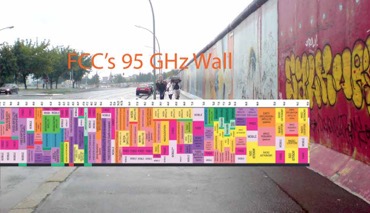
Present FCC rules have no provisions for licensed or unlicensed above 95 GHz and petitions for such move at a glacial pace while other countries subsidize such R&D
But as we have mentioned previously FCC's barrier to innovation at 95 GHz is quite real. The FCC's inaction on Battelle's RM-11713 102-109.5 GHz petition as well as the IEEE-USA request for a declaratory ruling (Docket 13-259) above on whether technology above 95 GHz is "new technology". (Not to mention the 2.5 years it took for FCC to untangle its apparently unintended wording in the revised Part 5 rules that forbid all experiments in passive bands (which are numerous in the mmW region) regardless of whether the nature of the experiment posed an actual interference threat to passive users.)
While we do not begrudge CTIA members access to mobile spectrum up to 71 GHz or even higher, does CTIA and its wishes like Donald Trump "suck all the oxygen out of the room"? We acknowledge that FCC has a spectrum policy productivity problem, but if that is the issue shouldn't FCC also acknowledge it and show what impact it is having on US competitiveness?
The basic reason why 5G mmW technology is even here now is that FCC took visionary action in 1995 in Docket 94-124 creating the first 60 GHz unlicensed band in the world and in 2003 in Docket 02-148 establishing the world's first 70/80/90 GHz bands just as it took action in 1985 creating the unlicensed ISM bands that are now home to Wi-Fi, Bluetooth and myriad other systems that have changed our world. When FCC took these three decisions they were not in response to major trade association like CTIA, indeed, some trade associations, including CEA/CTA's predecessor, actually opposed the 1985 decision.
It was because FCC stayed true to its original §303(g) mandate and had the confidence to prepare for the future — not spend all of its resources reacting to requests for instant gratification from powerful groups.
Status of IEEE-USA Petition at FCC
FCC Exceptionalism:
Website Clutter Continues
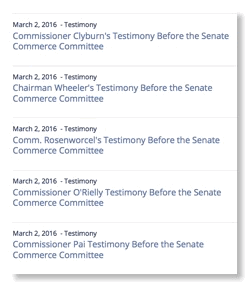
Note the title here starts with "FCC Exceptionalism". In the previous post I discussed two other aspects of FCC exceptionalism that differ from all other federal regulatory agencies:
- ex parte rules unique in the federal government
- an inspector general disinterested in agency effectiveness even though that is a statutory requirement of the position
The website clutter apparently comes from trying to give the appearance of collegiality among the commissioners by giving top billing to the utterances of each and the lack of anyone having any control on the website other than filling it with announcements than can come from a variety of source.
No other regulatory commission in the federal government puts analogous statements of its commissioners, either congressional testimony or congratulatory statements or condolence statements, on the top of their website.  Indeed, not other regulatory agency even puts both the names and photos of its commissioners on the top page either.
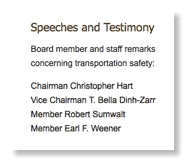
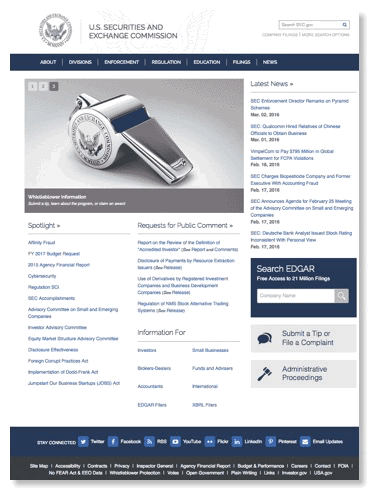
UPDATE
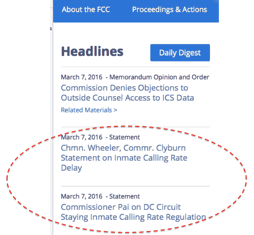
No other regulatory commission in the federal government does this!
Maybe This ex parte Kerfuffle Will Lead to Real Reform in BOTH ex parte Rules at FCC and Its Noncurious IG
US Senate Report reveals that @TomWheelerFCC @FCC emails show "an attempt to avoid exparte filings" #netneutrality https://t.co/T7Oj4dzADM
— Rob Evans (@RobEvan57342786) March 1, 2016
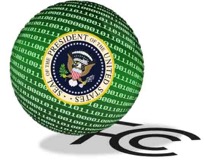
I have no idea about whether the substance of the allegations in the report are correct, but will herein address two underlying issues that have been recurring issues here:
- FCC's ineffective ex parte rules and the disinterest in enforcing them
- FCC's notoriously noncurious and not very credible Inspector General
EX PARTE ISSUES
FCC's ex parte rules were last updated in 2011 in Docket 10-43. In my comments to that rulemaking I stated (p.2)
Among all the federal involved in administrative rulemakings agencies – both Executive Branch agencies and independent agencies – only the Commission has an ex parte system that depends entirely on statements filed by outside parties as the sole source of information in its docket files. As far as we can determine, every other federal agency involved in such rulemakings uses a notification prepared by its own staff, possibly with the inclusion of material provided by the outside party.
The simple fact is that ANY outside party contacting FCC, be it the White House or a Fortune 500 company, has mixed incentives about reveals the nature of the contact and even it existence. FCC's sole focus on these parties' sole responsibility for documenting the meeting is an invitation to problems - which I saw repeatedly during my 25 years at FCC.
In the decision in this rulemaking FCC dismissed my concerns in para. 71 stating"
Other agencies may be differently situated to the extent their docket is primarily adjudicatory rather than rulemaking (e.g., the Federal Trade Commission). Also, staff summaries raise an issue of fairness. The complex legal and technical nature of the issues sometimes presented ex partemake it preferable for the parties arguing those issues to summarize them.
Perhaps the FTC's workload is more adjudicatory than FCC's, but while FCC likes to view the singular nature of its jurisdiction, FAA, NRC, and EPA all has very technical rule makings not that different from FCC's.
However, since those comments were drafted additional information has become available that contradicts one point I made and in the interests of truth I will present it here. In May 2014 the Administrative Conference of the United States, "an independent federal agency dedicated to improving the administrative process through consensus-driven applied research, providing nonpartisan expert advice and recommendations for improvement of federal agency procedures", issued a report entitled "Ex Parte Communications in Informal Rulemaking". It surveyed agency peace in the area and came up with the following conclusion:
"All agencies except two place the burden of disclosure on the agency. FCC and CFPB require the public stakeholder to disclose an ex parte communication. The other agencies either specify that agency personnel are charged with disclosing an ex parte communication or presume the burden falls on agency personnel." (p. 66)
Now my comments were filed in March 2010 and the CFBP policy on ex parte was issued in August 2011, so my comments were correct when filed. However, the CFBP policy states at §(d)(1) "If a summary of an oral ex parte presentation is incomplete or inaccurate, CFPB staff may require the filer to correct any inaccuracies or missing information." FCC rules do not address this quality control issue and the reality is that many parties talking to the FCC staff do not want an accurate public representation of what they said.
The FCC 2011 decision talked repeatedly about more enforcement of these ex parte rules. Comm. Copps said in his statement
"I am confident that the reforms we make to our ex parte rules—combined with rigorous enforcement—will usher in a new era of transparency, openness and credibility to our work.
As if on cue, FCC sent a letter in January 2012 to the Alaska Railroad Corporation, which is owned by the State of Alaska, stating it had violated the ex parte rules because an employee had sent an e-mail with attachments to an FCC staffer dealing with a rulemaking and both failed to file a copy in the docket and again failed to do so when asked by the FCC staffer. In February 2014 Alaska Railroad agreed to a 2.5 page “compliance plan” (p. 4-7) and “a voluntary contribution to the United States Treasury in the amount of ten thousand dollars ($10,000)”.
FCC also started in 2011 a new web page on ex parte violations which were previous not disclosed, perhaps due to "professional courtesy" to the private sector lawyers involved. So what has happened to ex parte enforcement at FCC since then? NOT MUCH!
The $10,000 "voluntary contribution" of the hapless Alaskan agency was a one time thing, perhaps targeted at an out-of-town cash rich entity that could be talked into paying up without questioning the legality of what was going on. The enforcement page slowly filed with entries: 14 in 2011, 2 in 2012, and 2 in 2013 - notice a trend? Last year I called up an FCC OGC official and observed there were no entries since March 2013. They quickly added 2 public notices of sunshine period violation, one for 2013 and 1 for 2014; but these are really different from all the other enforcement issues here.
Has ex parte compliance suddenly become perfect or has FCC just lost all interest in the matter?
INSPECTOR GENERAL ISSUES
FCC Inspector General has been a recurring issue here. It is a very bipartisan issue at FCC: under many chairmen of both parties there has been no interest in letting the IG perform all his statutory duties. Since the first FCC IG in March 1989, all of the incumbents have been cronies of the top leadership, apparently chosen for their lack of curiosity and willingness to spend virtually all their resources on USF fraud and related issues, with a occasional diversion to misconduct by junior FCC staffers. What about the other oversight required by 5 USC App. 4(a)(2)? No interest even though the size of the present IG staff at FCC has zoomed to 60 FTE and its budget for FY16 to $11.8M. The FCC's FY17 budget rationalizes this as
"Currently OIG only takes on top-level investigation cases and top risk finance and program audits. The Office keeps focus on increasing mission responsibility and ensuring appropriate staff levels to keep pace with the workload."
One might think that the instant allegations of improper White House ex parte contact in an independent agency such as FCC might have been handled quickly and decisively by a credible FCC IG investigation. But the decades of bipartisan cronyism between the FCC IG and FCC leadership makes the FCC IG not credible on such issues. In 2009 and 2010 I wrote here posts entitled "A Credible Inspector General Would Make FCC More Credible". It is still true.
A credible FCC IG could address the present allegations in a nonpartisan way and let the chips fall where they may. But since that is not feasible this issue will drag on probably until the end of the Obama Administration in partisan bickering that will lower already low FCC productivity.



![Validate my RSS feed [Valid RSS]](valid-rss-rogers.png)

